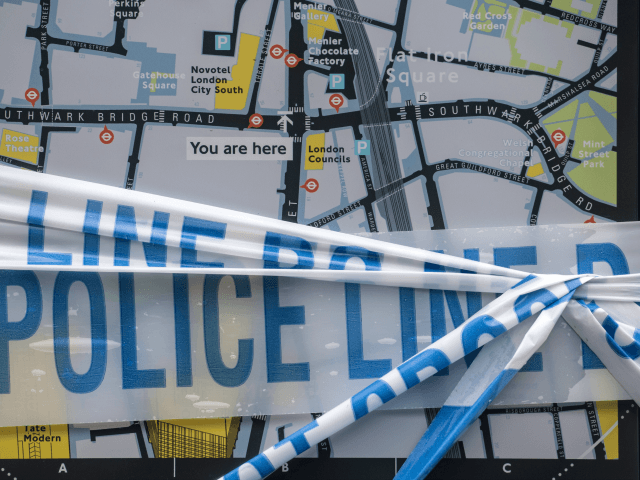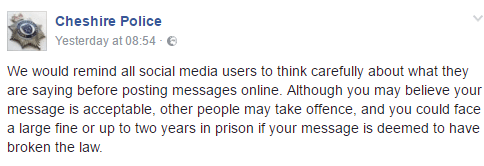Cheshire Police are under fire for issuing a warning to Facebook users to “think carefully about what they are saying” online in the wake of the London Bridge terror attacks, or they might end up in prison.
“We would remind all social media users to think carefully about what they are saying before posting messages online,” the force warns.
“Although you may believe your message is acceptable, other people may take offence, and you could face a large fine or up to two years in prison if your message is deemed to have broken the law.”
The comment quickly attracted swathes of facetious replies.
“Cheshire Police would like to inform you that although they know of 3000 suspected extremists living in the UK currently under investigation including 650 known Jihadi’s [sic] that returned to the country after fighting with ISIS just be aware that they are monitoring Facebook 24 Hours a day, 7 Days a week in case anyone’s feelings get hurt,” wrote one user.
“We would like to remind Cheshire Police to be careful when posting on social media. Although you might feel your message is acceptable, others may take offence. Like, for instance, people who feel that your abject pandering to political correctness only goes to demonstrate that you are part of the problem instead of the solution,” commented another.
The force eventually acknowledged the negative reaction, obliquely, in a follow-up post:
“We can see that this has prompted a lot of discussion and we want to clarify our guidance,” they wrote.
“Whilst we are aware social media is a good platform for discussing issues, there can sometimes come a point that it is no longer a conversation and instead comments can be classed as a form of hate crime.
“Hate crime can be committed when someone uses threatening words or behaviour or publications such as social media, which are intended or likely to encourage hatred towards other people.
“Currently, the law covers the targeting of people in this way on the basis of race/ethnicity, religion, disability, gender identity or sexual orientation. These crimes are about more than just showing hostility to one person, but about stirring up hatred against a whole group of people, regardless of what platform you use.”
Think before you post or you may receive a visit from us this weekend. Use the internet safely. #thinkbeforeyoupost pic.twitter.com/xNiDMf3jPA
— GreaterGlasgPolice (@GreaterGlasgPol) April 1, 2016
Cheshire Police are not the first British police force to be criticised for an apparently inordinate focus on policing social media posts.
Greater Glasgow Police was roundly mocked after warning Twitter users to “Think before you post or you may receive a visit from us this weekend” just days after the Brussels terror bombings in March 2016.
UK authorities ACTIVELY ENCOURAGE reports of "Islamophobia" after "trigger events" like #Westminster terror attack. https://t.co/WjNTrSgF0m
— Jack Montgomery ن (@JackBMontgomery) March 29, 2017
Last summer, Assistant Chief Constable Maurice Mason told a council meeting in Thurrock, that:
“Some members of the public complaining about Nigel Farage, or whatever, that will get recorded as a hate crime no matter what it is. If the person feels it’s a hate crime it will get recorded as a hate crime.”


COMMENTS
Please let us know if you're having issues with commenting.